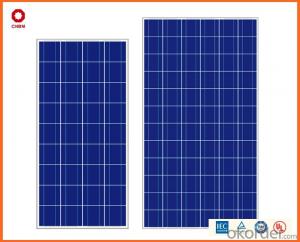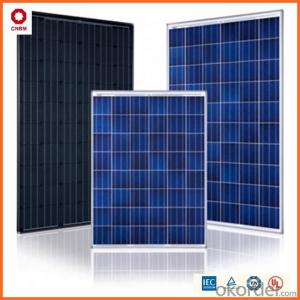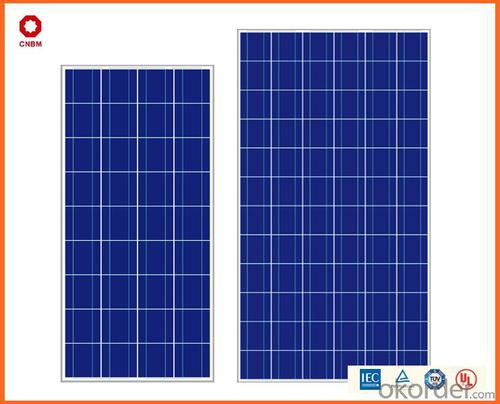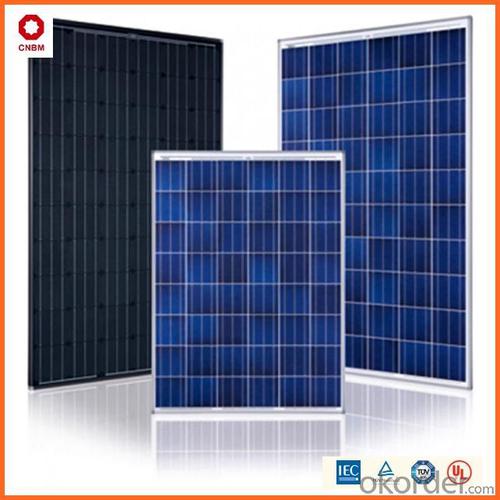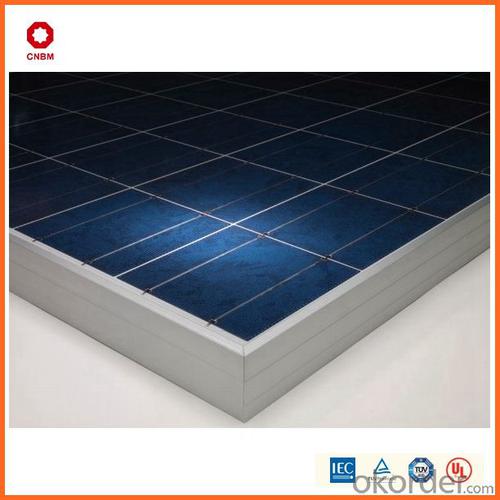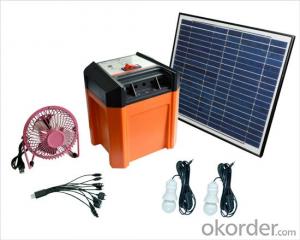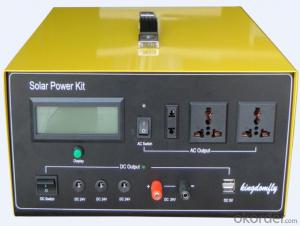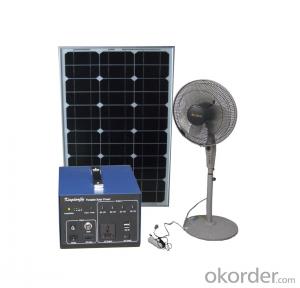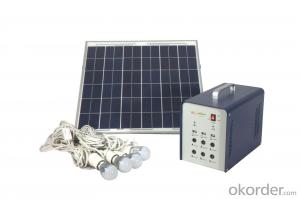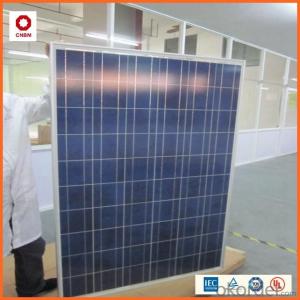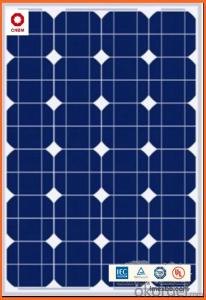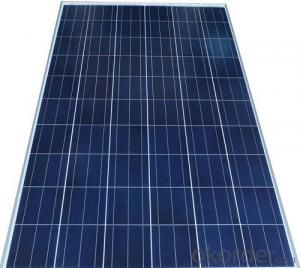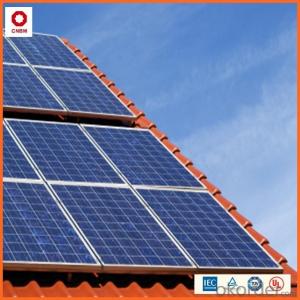Photovoltaic Solar Energy Systems - Hot Sale 35W Small Solar Panel with Good Quality
- Loading Port:
- China main port
- Payment Terms:
- TT OR LC
- Min Order Qty:
- 11 watt
- Supply Capability:
- 10000000 watt/month
OKorder Service Pledge
OKorder Financial Service
You Might Also Like
Product Description:
Hot Sale !!! Quality and Safety of Small Poly Solar Panel 35~85w
1. Rigorous quality control meets the highest international standards.
2. High-transmissivity low-iron tempered glass, strong aluminium frame.
3. Using UV-resistant silicon.
4. IS09001/14001/CE/TUV/UL
Warranties of Small Poly Solar Panel 35~85w
1. 10 years limited product warranty
2. 15 years at 90% of the minimal rated power output
3. 25 years at 80% of the minimal rated power output
Technical date of 45w-85w Poly Solar Panel
ITEM NO.: | Mono 125*125 cell ,36pcs . Power range from 80Wp-100Wp | ||||||||
Maximum Power(W) | 80 | 85 | 90 | 95 | 100 | ||||
Optimum Power Voltage(Vmp) | 17.81 | 17.89 | 17.94 | 17.99 | 18.06 | ||||
Optimum Operatige Current(Imp) | 4.78 | 4.91 | 5.12 | 5.35 | 5.59 | ||||
Open Circuit Voltage(Voc) | 21.98 | 22.05 | 22.14 | 22.28 | 22.45 | ||||
Short Circuit Current(Isc) | 4.95 | 5.15 | 5.36 | 5.65 | 5.84 | ||||
Solar Cell: | 125*125 Mono | ||||||||
Number of Cell(pcs) | 4*9 | ||||||||
Brand Name of Solar Cells | JA Cell, Bluesun Cell | ||||||||
Size of Module(mm) | 1580*808*35 | ||||||||
Caple & Connector Type | Pass the TUV Certificate | ||||||||
Frame(Material Corners,etc.) | Aluminium-alloy | ||||||||
Backing (Brand Type) | TPT | ||||||||
Cell Efficiency for 100W(%) | 15.8% | ||||||||
Weight Per Piece(KG) | 12.0KG | ||||||||
FF (%) | 70-76% | ||||||||
Junction Box Type | Pass the TUV Certificate | ||||||||
Tolerance Wattage(e.g.+/-5%) | ±3%, or 0-3% | ||||||||
Front Glass Thikness(mm) | 3.2 | ||||||||
Temperature Coefficients of Isc(%) | +0.04 | ||||||||
Temperature Coefficients of Voc(%) | -0.38 | ||||||||
Temperature Coefficients of Pm(%) | -0.47 | ||||||||
Temperature Coefficients of Im(%) | +0.04 | ||||||||
Temperature Coefficients of Vm(%) | -0.38 | ||||||||
Temperature Range | -40°C to +85°C | ||||||||
Surface Maximum Load Capacity | 2400Pa | ||||||||
Allowable Hail Load | 23m/s ,7.53g | ||||||||
Bypass Diode Rating(A) | 12 | ||||||||
Warranty | 90% of 10 years,80% of 25 years. | ||||||||
Standard Test Conditions | AM1.5 1000W/ 25 +/-2°C | ||||||||
Packing | carton or pallet | ||||||||
1*20' | 25 Pallets / 450pcs | ||||||||
1*40'STD | 25 Pallets / 100pcs | ||||||||
Features of our products:
• High conversion efficiency mono/poly-crystalline amorphous silicon solar cells
• Modules incorporate high performance bypass diodes to minimize the power drop caused by shading
• High transmittance, low-iron tempered glass
• High performance EVA encapsulant to prevent destroying and water.
• AI frame: without screw, corner connection. 8 holes on the frame can be installed easily
• Good performance of preventing from atrocious weather such as wind and hails
• Certifications: CE IEC TUV VDE UL, Class I
• 10 years 90% power output warranty

Shipping of Small Poly Solar Panel 35~85w
By Sea | Delivery from Shanghai or Ningbo seaport |
By Air | Departure from Shanghai Pudong Airport |
By Express | Post by DHL, EMS, UPS, TNT. |
- Q: How do solar energy systems impact roof maintenance and repairs?
- Solar energy systems can have both positive and negative impacts on roof maintenance and repairs. On the positive side, solar panels can provide an added layer of protection to the roof surface, shielding it from harsh weather conditions and UV radiation. This can help extend the lifespan of the roof, reducing the need for frequent repairs or replacements. Additionally, solar panels can prevent debris from accumulating on the roof, reducing the risk of damage caused by fallen leaves, branches, or other objects. However, there are also some considerations when it comes to roof maintenance and repairs with solar energy systems. Installing solar panels generally requires drilling holes into the roof to secure the mounting brackets, which can potentially lead to leaks if not properly sealed. Therefore, it is crucial to work with experienced and qualified installers who understand the importance of proper sealing and waterproofing. Another factor to consider is access to the roof. Solar panels cover a significant portion of the roof surface, making it more difficult to access and inspect the roof. Regular roof maintenance tasks, such as cleaning gutters, removing debris, or inspecting for damage, may require additional effort and specialized equipment when solar panels are present. In terms of repairs, solar panels can complicate the process. If a repair is required on the roof, the solar panels may need to be temporarily removed to access the damaged area. This can add time and cost to the repair process. Additionally, it is important to coordinate with the solar panel manufacturer or installer to ensure that any repairs are done in a way that does not void the warranty or affect the performance of the solar system. In summary, solar energy systems can have a positive impact on roof maintenance by providing added protection and reducing the risk of damage. However, it is important to work with experienced installers, ensure proper sealing, and consider the impact on access and repairs when installing solar panels.
- Q: What is the expected maintenance cost of a solar energy system?
- The expected maintenance cost of a solar energy system can vary depending on several factors. However, on average, the maintenance cost of a solar energy system is relatively low compared to other forms of energy generation. Solar panels, which are the most crucial component of a solar energy system, are typically designed to be durable and require minimal maintenance. They are built to withstand various weather conditions and can last for decades with proper care. However, occasional maintenance may be required to ensure optimal performance. The maintenance requirements for a solar energy system usually involve cleaning the panels to remove any dirt, dust, or debris that may accumulate over time. This can be done using water and a soft brush or with the help of automated cleaning systems. It is recommended to clean the panels at least once or twice a year, but this can vary depending on the location and environmental factors. In addition to cleaning, regular inspections of the solar energy system are also necessary. This includes checking for any signs of damage, loose connections, or potential issues with the electrical wiring. Inspections can be conducted by the system owner or a professional solar installer, and they are usually done on an annual basis. Overall, the expected maintenance cost of a solar energy system can be relatively low, typically ranging from 0.5% to 1% of the total installation cost per year. This cost primarily includes the expenses for cleaning, inspections, and any minor repairs that may be required. However, it is important to note that the actual maintenance cost can vary depending on the size of the system, its location, and the specific maintenance requirements. In conclusion, while there are some maintenance tasks associated with a solar energy system, the expected cost is generally low compared to other energy systems. With proper care and regular inspections, a solar energy system can continue to generate clean and renewable energy for many years with minimal maintenance expenses.
- Q: Can solar energy systems be used in powering amusement parks?
- Yes, solar energy systems can be used to power amusement parks. Solar panels can be installed on the roofs of buildings, parking structures, or in open spaces within the park to generate electricity from the sun. This renewable energy source can help reduce the park's reliance on traditional grid power, lower operating costs, and decrease its carbon footprint. Additionally, solar energy systems can provide a reliable and consistent source of power, making them suitable for meeting the electrical demands of amusement parks.
- Q: How does a solar panel generate electricity?
- A solar panel generates electricity through the photovoltaic effect, where sunlight is converted into electrical energy. This process occurs when the photons in sunlight strike the solar cells within the panel, causing the electrons in the cells to be excited and flow as an electric current.
- Q: Can solar energy systems be used in developing countries?
- Yes, solar energy systems can be used in developing countries. In fact, solar energy has great potential in these regions due to its accessibility, abundance, and ability to provide clean and sustainable power. Solar energy systems can help address energy poverty, reduce reliance on fossil fuels, improve access to electricity in remote areas, and promote economic development and social empowerment in developing countries.
- Q: Can solar energy systems be used for powering amusement parks?
- Yes, solar energy systems can definitely be used for powering amusement parks. With the advancements in solar technology and the ability to harness and store solar energy, amusement parks can install solar panels to generate electricity and meet their power requirements. Solar energy systems can be integrated into the park's infrastructure, such as on rooftops, parking lots, or open spaces, to provide clean and sustainable energy for rides, lighting, and other operational needs. Additionally, solar power can help reduce carbon emissions and operating costs, making it an environmentally friendly and economically viable solution for powering amusement parks.
- Q: Are solar panels weather-resistant?
- Yes, solar panels are weather-resistant. They are designed to withstand various weather conditions, including rain, snow, hail, and high winds. The materials used in solar panels are durable and can withstand exposure to different climates and temperatures. However, extreme weather events like hurricanes and tornadoes can potentially damage solar panels, although this is relatively rare.
- Q: Can solar energy systems be used in remote areas without access to the grid?
- Yes, solar energy systems can be used in remote areas without access to the grid. Solar panels can generate electricity by harnessing sunlight, which can then be stored in batteries for use when the sun is not available. This makes solar energy systems a reliable and sustainable solution for powering remote areas that are off the grid.
- Q: How does the efficiency of solar panels vary across different climates?
- Solar panel efficiency can differ in various climates due to a range of factors. The availability of sunlight is one of the key factors. Solar panels function by converting sunlight into electricity, so regions with higher levels of sunlight generally have higher solar panel efficiency. In hot and sunny climates like deserts or tropical areas, solar panels tend to perform exceptionally well. These regions receive intense sunlight, providing abundant energy for the panels to convert into electricity. Consequently, solar panels in these climates achieve higher efficiency levels. In contrast, cooler or cloudier climates may result in slightly lower solar panel efficiency. Cloud cover reduces the amount of sunlight reaching the panels, affecting their overall performance. Additionally, colder temperatures can impact the efficiency of solar panels, as they work best in warmer conditions. Nonetheless, solar panels are designed to function in diverse climates and can still generate electricity even in less sunny or colder regions. Technological advancements have led to the development of solar panels that can absorb sunlight even in low-light conditions, thereby increasing their efficiency in less favorable climates. Moreover, climate is not the sole determinant of solar panel efficiency. Other factors such as panel orientation, tilt angle, shading, and the quality of solar cells used also play a significant role. Proper installation and maintenance greatly influence the overall efficiency of solar panels, regardless of the climate. To summarize, solar panel efficiency varies across climates due to factors like sunlight intensity, cloud cover, and temperature. Although solar panels perform better in hot and sunny regions, advancements in technology enable them to generate electricity even in less favorable conditions. Proper installation, maintenance, and consideration of other factors are crucial in maximizing solar panel efficiency across different climates.
- Q: Do solar panels work on cloudy days?
- Yes, solar panels do work on cloudy days, although their efficiency may be reduced compared to sunny days. While they generate less electricity in overcast conditions, they can still produce a significant amount of power due to the diffuse sunlight that reaches them.
Send your message to us
Photovoltaic Solar Energy Systems - Hot Sale 35W Small Solar Panel with Good Quality
- Loading Port:
- China main port
- Payment Terms:
- TT OR LC
- Min Order Qty:
- 11 watt
- Supply Capability:
- 10000000 watt/month
OKorder Service Pledge
OKorder Financial Service
Similar products
Hot products
Hot Searches
Related keywords

